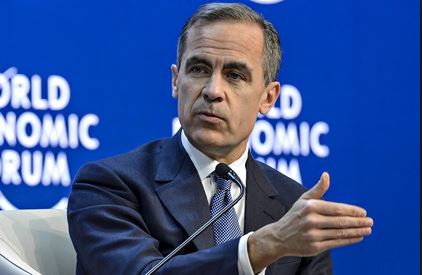Record-low interest rates may not last as long as investors expect, Bank of England governor Marc Carney warned in a session with other financial leaders on the world economy in Davos, Switzerland.
Mr. Carney added that the UK’s central bank is monitoring wage hikes closely. Wages in the UK have not kept up with inflation for several years, despite the economy growing faster than in any other developed nation in 2014. Only recently has pay started to pick up.
Economists suspect wages will now rise rapidly, in order to make up for years of stagnation.
Mr. Carney said:
“One word on the UK – is that we have a very low inflation environment right now largely caused by commodity prices and an ability to look through that.”
“We have the means, the responsibility and the will to return inflation back to target in the two-year horizon.”

Mr. Carney does not believe the UK will slide into a deflationary spiral.
The Bank of England’s (BoE’s) Monetary Policy Committee (MPC) believes the annual inflation rate will continue falling, after dropping to 0.5% in December from November’s 1%. It may even turn negative in the months to come. However, it will then increase as oil prices either stabilize or start rising again and wages grow.
It is likely the MPC will consider a modest interest rate hike earlier than most investors are currently expecting.
With unemployment dipping to below 6%, the UK appears to have prevented the 2008 financial crisis and the Great Recession that followed from creating a lost generation of unemployed citizens, as has occurred in France and several Eurozone nations, Mr. Carney added.
Mr. Carney suggested the MPC is more optimistic than outside analysts that it can bring annual inflation to its target of 2%. “It is not lost on us that wages are picking up now in the most recent data and [are] consistent with our expectations,” he said.
Carney cautiously welcomes ECB’s quantitative easing
The Governor cautiously welcomed the ECB’s (European Central Bank’s) quantitative easing announcement, whereby it will pump €1.1 trillion ($1.23 trillion, £822 million) into the Eurozone’s ailing economy.
The ECB will purchase €60 billion of bonds each month from banks, which will expand the money supply, maintain low interest rates, and hopefully boost spending.
However, he added that QE needs to be closely monitored, because governments and traders may be tempted to take financial risks and trigger another global financial crisis.
Davos Video – Global Economic Outlook
“What should be at the top of the agenda for the global economy in the year ahead?”
Speakers: Haruhiko Kuroda (Governor of the Bank of Japan), Min Zhu ( Deputy Managing Director of the IMF), Mark J. Carney (Governor of the Bank of England), Joaquim Levy (Brazil’s Finance Minister), Laurence Fink (Chairman and CEO of BlackRock), and Benoît Coeuré (ECB Executive Board member).
